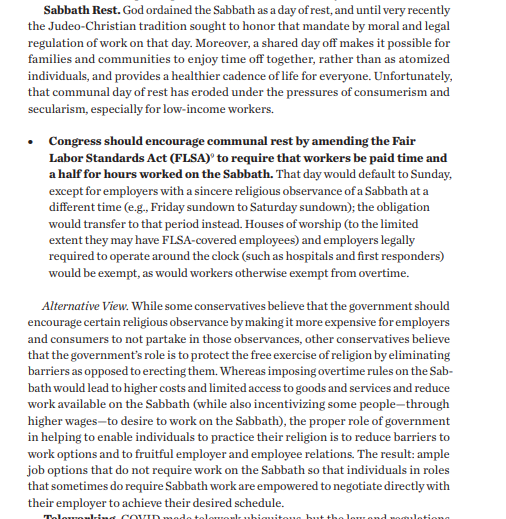
Project 2025’s Proposal to amend the Fair Labor Standards Act (FLSA) to mandate time-and-a-half pay for Sunday work reflects a traditional view of the Sabbath. However, this focus on Sunday has sparked concerns among religious groups like Seventh-day Adventists, who observe the Sabbath from Friday sundown to Saturday sundown. While the proposal includes provisions for varying Sabbath practices, its primary emphasis on Sunday could inadvertently marginalize other faiths.
[dc]I[/dc]n a bid to shape the landscape of future conservative governance, The Heritage Foundation, in partnership with over 50 conservative organizations, has launched an ambitious initiative known as Project 2025. This effort seeks to meticulously prepare for the next conservative administration by developing a detailed policy framework and cultivating a well-trained cadre of personnel poised to implement these policies.
A Historical Context
The roots of Project 2025 trace back to longstanding efforts within conservative circles to reclaim and redefine governance. The initiative embodies a strategic response to perceived overreach by the federal government and aims to restore conservative values across American society. The Heritage Foundation, a stalwart of conservative thought leadership since its inception in 1973, has galvanized a broad coalition to support this endeavor, signaling a unified front in anticipation of the next presidential election.
Comprehensive Strategy and Training
At the core of Project 2025 are comprehensive plans for managing federal agencies, a robust personnel database, and a Presidential Administration Academy designed to train future government officials. This multi-faceted approach underscores the initiative’s commitment to ensuring effective and immediate governance from day one of a new administration. The project is about policy creation and equipping a new generation of conservative leaders with the necessary skills and knowledge.
Internal Divisions and the Trump Factor
Despite its widespread endorsement among conservative organizations, Project 2025 has encountered notable resistance from former President Donald Trump. His distancing from the project highlights underlying tensions within the conservative movement about the best path forward for governance and policy implementation. This schism underscores the diversity of thought within the movement and raises questions about the unity and direction of future conservative leadership.
The Sabbath Observance Debate

Among the myriad issues addressed in the 920-page “2025 Mandate for Leadership” document, Sabbath observance has garnered significant attention. Page 589 emphasizes the societal benefits of a shared day of rest, advocating for a return to traditional Sabbath observance as a means of strengthening family and community bonds. However, this proposal raises complex questions in a secular and diverse society.
Policy Recommendations and Potential Biases
The document suggests amending the Fair Labor Standards Act (FLSA) to promote Sabbath observance by mandating time-and-a-half pay for Sunday work. This financial incentive aims to reduce Sunday work hours, reflecting a traditional view of the Sabbath. However, the focus on Sunday as the default day of rest has sparked concerns among religious groups with different Sabbath practices, particularly Seventh-day Adventists, who observe their Sabbath from Friday sundown to Saturday sundown.
Should Seventh-day Adventists Be Concerned?
We can leave the eschatological implications to the theologians. Still, practically speaking, an emphasis on Sunday observance could be a cause for concern for Seventh-day Adventists and other groups with different Sabbath practices. While the proposal includes provisions for varying Sabbath observances, its primary focus on Sunday might inadvertently favor the majority view, potentially marginalizing other religious practices. This concern is particularly poignant for Seventh-day Adventists, who may perceive the policy as not fully accommodating their beliefs.
Adventists and many other religious organizations have long championed the value of a weekly day of rest and advocated tirelessly for the right to avoid work during the 24 hours from Friday sundown to Saturday sundown while also advocating for those who kept Sunday as a day of rest. They have actively worked in favor of religious accommodation for Sabbath-keepers, be they Sunday or Saturday observers or those who observe other holy days, and many filed amicus briefs in favor of accommodation in the recent Supreme Court case Groff v. Dejoy (2023) in which the Court unanimously ruled in favor of stronger religious accommodation standards.
So it’s not an issue of trying to avoid providing families with a weekly day of rest – this is something that Seventh-day Adventists value and uphold. But by implicitly prioritizing Sunday, and referencing the accommodation rights of “employers” rather than employees, it risks creating a perception of inequality and a lack of comprehensive support for all religious practices. Ensuring that all Sabbath observances are treated equally is vital for fostering an inclusive workplace environment. Adventists and others might worry that their needs and practices are not fully understood or respected, leading to potential conflicts and feelings of exclusion.
Broader Implications
The emphasis on Sunday could set a precedent that unintentionally biases workplace policies and practices, leading to potential conflicts and feelings of exclusion among diverse religious groups. To mitigate these risks, Project 2025 must strive for more inclusive language and equitable consideration of all religious practices, ensuring that the proposed policies genuinely respect and accommodate the diversity of faith in America.
Conclusion
Project 2025 represents a comprehensive effort to modify the current model of governance. Its focus on religious accommodation in the brief section on religion and Sabbath observance reflects a commitment to protecting employee rights and promoting rest. However, the initiative must carefully balance these goals with the realities of a diverse society to ensure that its policies are inclusive and respectful of all religious practices. As Project 2025 moves forward, its success will depend on its ability to navigate these complexities and foster a successful approach to governance.

Revelation 13:1-18
1 And I stood upon the sand of the sea, and saw a beast rise up out of the sea, having seven heads and ten horns, and upon his horns ten crowns, and upon his heads the name of blasphemy.
2 And the beast which I saw was like unto a leopard, and his feet were as the feet of a bear, and his mouth as the mouth of a lion: and the dragon gave him his power, and his seat, and great authority.
3 And I saw one of his heads as it were wounded to death; and his deadly wound was healed: and all the world wondered after the beast.
4 And they worshipped the dragon which gave power unto the beast: and they worshipped the beast, saying, Who is like unto the beast? who is able to make war with him?
5 And there was given unto him a mouth speaking great things and blasphemies; and power was given unto him to continue forty and two months.
6 And he opened his mouth in blasphemy against God, to blaspheme his name, and his tabernacle, and them that dwell in heaven.
7 And it was given unto him to make war with the saints, and to overcome them: and power was given him over all kindreds, and tongues, and nations.
8 And all that dwell upon the earth shall worship him, whose names are not written in the book of life of the Lamb slain from the foundation of the world.
9 If any man have an ear, let him hear.
10 He that leadeth into captivity shall go into captivity: he that killeth with the sword must be killed with the sword. Here is the patience and the faith of the saints.
11 And I beheld another beast coming up out of the earth; and he had two horns like a lamb, and he spake as a dragon.
12 And he exerciseth all the power of the first beast before him, and causeth the earth and them which dwell therein to worship the first beast, whose deadly wound was healed.
13 And he doeth great wonders, so that he maketh fire come down from heaven on the earth in the sight of men,
14 And deceiveth them that dwell on the earth by the means of those miracles which he had power to do in the sight of the beast; saying to them that dwell on the earth, that they should make an image to the beast, which had the wound by a sword, and did live.
15 And he had power to give life unto the image of the beast, that the image of the beast should both speak, and cause that as many as would not worship the image of the beast should be killed.
16 And he causeth all, both small and great, rich and poor, free and bond, to receive a mark in their right hand, or in their foreheads:
17 And that no man might buy or sell, save he that had the mark, or the name of the beast, or the number of his name.
18 Here is wisdom. Let him that hath understanding count the number of the beast: for it is the number of a man; and his number is Six hundred threescore and six.
Advent Messengers .Org